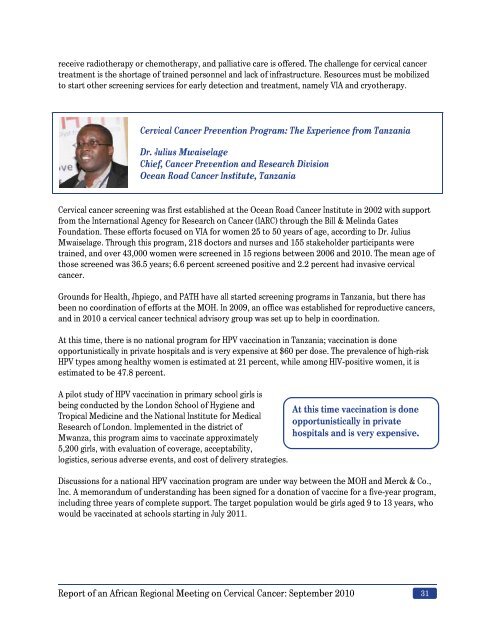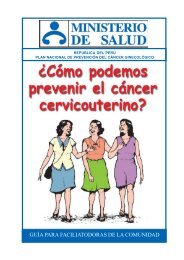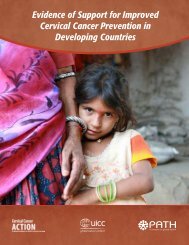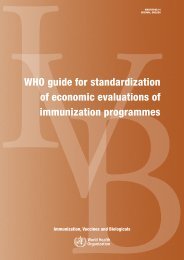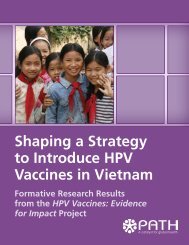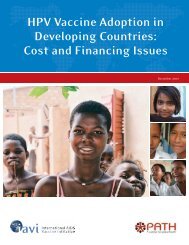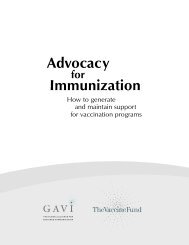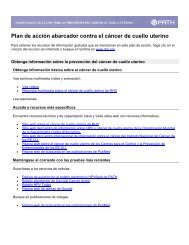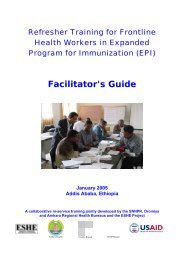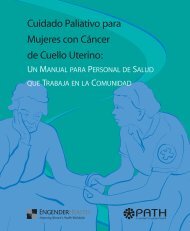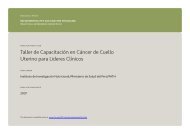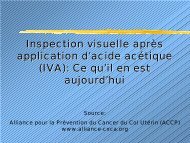Download file, English (1 MB PDF) - RHO
Download file, English (1 MB PDF) - RHO
Download file, English (1 MB PDF) - RHO
You also want an ePaper? Increase the reach of your titles
YUMPU automatically turns print PDFs into web optimized ePapers that Google loves.
eceive radiotherapy or chemotherapy, and palliative care is offered. The challenge for cervical cancer<br />
treatment is the shortage of trained personnel and lack of infrastructure. Resources must be mobilized<br />
to start other screening services for early detection and treatment, namely VIA and cryotherapy.<br />
Cervical Cancer Prevention Program: The Experience from Tanzania<br />
Dr. Julius Mwaiselage<br />
Chief, Cancer Prevention and Research Division<br />
Ocean Road Cancer Institute, Tanzania<br />
Cervical cancer screening was first established at the Ocean Road Cancer Institute in 2002 with support<br />
from the International Agency for Research on Cancer (IARC) through the Bill & Melinda Gates<br />
Foundation. These efforts focused on VIA for women 25 to 50 years of age, according to Dr. Julius<br />
Mwaiselage. Through this program, 218 doctors and nurses and 155 stakeholder participants were<br />
trained, and over 43,000 women were screened in 15 regions between 2006 and 2010. The mean age of<br />
those screened was 36.5 years; 6.6 percent screened positive and 2.2 percent had invasive cervical<br />
cancer.<br />
Grounds for Health, Jhpiego, and PATH have all started screening programs in Tanzania, but there has<br />
been no coordination of efforts at the MOH. In 2009, an office was established for reproductive cancers,<br />
and in 2010 a cervical cancer technical advisory group was set up to help in coordination.<br />
At this time, there is no national program for HPV vaccination in Tanzania; vaccination is done<br />
opportunistically in private hospitals and is very expensive at $60 per dose. The prevalence of high-risk<br />
HPV types among healthy women is estimated at 21 percent, while among HIV-positive women, it is<br />
estimated to be 47.8 percent.<br />
A pilot study of HPV vaccination in primary school girls is<br />
being conducted by the London School of Hygiene and<br />
Tropical Medicine and the National Institute for Medical<br />
Research of London. Implemented in the district of<br />
Mwanza, this program aims to vaccinate approximately<br />
5,200 girls, with evaluation of coverage, acceptability,<br />
logistics, serious adverse events, and cost of delivery strategies.<br />
At this time vaccination is done<br />
opportunistically in private<br />
hospitals and is very expensive.<br />
Discussions for a national HPV vaccination program are under way between the MOH and Merck & Co.,<br />
Inc. A memorandum of understanding has been signed for a donation of vaccine for a five-year program,<br />
including three years of complete support. The target population would be girls aged 9 to 13 years, who<br />
would be vaccinated at schools starting in July 2011.<br />
Report of an African Regional Meeting on Cervical Cancer: September 2010 31


